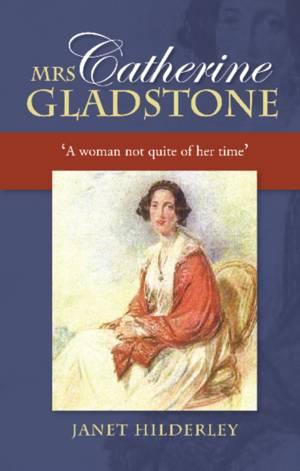
Je cadeautjes zeker op tijd in huis hebben voor de feestdagen? Kom langs in onze winkels en vind het perfecte geschenk!
- Afhalen na 1 uur in een winkel met voorraad
- Gratis thuislevering in België vanaf € 30
- Ruim aanbod met 7 miljoen producten
Je cadeautjes zeker op tijd in huis hebben voor de feestdagen? Kom langs in onze winkels en vind het perfecte geschenk!
- Afhalen na 1 uur in een winkel met voorraad
- Gratis thuislevering in België vanaf € 30
- Ruim aanbod met 7 miljoen producten
Zoeken
€ 20,95
+ 41 punten
Omschrijving
Catherine Glynne was born in 1812, in the same year as Charles Dickens. An earl's daughter she married the son of a self-made merchant, William Ewart Gladstone, who became Queen Victoria's Prime Minister on four occasions. While the Queen and the PM loathed each other, they both loved Catherine, Gladstone's wife. After a long and indecisive courtship, Gladstone said of his new wife that my Cathie forever twinkles. Society remarked that her beauty showed a profound intelligence. Catherine loved being in the main stream of action but disliked politicians, fashion and social niceties. Unusual for the time Gladstone was present at the birth of each of their eight children and Catherine insisted on feeding them herself. Mrs Gladstone's primary concern was support of the poor - in particular those suffering from cholera, near-starving mill girls and homeless orphans. She established the concept of free convalescent homes and her common-sense influenced the Poor Laws. To maintain her genius for charity she took every opportunity to approach Gladstone's friends for financial support for her good works. In return she found places for her husband's 'rescue' women - young girls forced into prostitution as a result of poverty. When her brother's ironworks failed Catherine and her family faced poverty. It was Gladstone's financial skills that saved the family from bankruptcy. Catherine died on 14th June, 1900. Pertinent to this biography is the letter the author wrote to the Church Times about the reasons behind the riots in London and elsewhere in the United Kingdom, in August 2011. The letter header - "Mrs Gladstone! thou shouldst be living at this hour" - drew attention to a personality who in her time confronted severe social need through community action (the letter text is reproduced on the Press website).
Specificaties
Betrokkenen
- Auteur(s):
- Uitgeverij:
Inhoud
- Aantal bladzijden:
- 224
- Taal:
- Engels
Eigenschappen
- Productcode (EAN):
- 9781898595557
- Verschijningsdatum:
- 4/10/2012
- Uitvoering:
- Paperback
- Formaat:
- Trade paperback (VS)
- Afmetingen:
- 137 mm x 213 mm
- Gewicht:
- 272 g

Alleen bij Standaard Boekhandel
+ 41 punten op je klantenkaart van Standaard Boekhandel
Beoordelingen
We publiceren alleen reviews die voldoen aan de voorwaarden voor reviews. Bekijk onze voorwaarden voor reviews.









